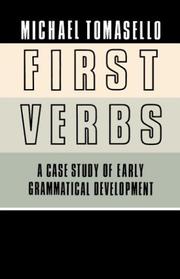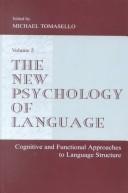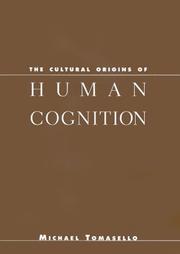| Listing 1 - 10 of 49 | << page >> |
Sort by
|
Book
ISBN: 9780674724778 0674724771 9780674726369 9780674986831 0674726367 0674727568 9780674727564 Year: 2014 Publisher: Cambridge, Massachusetts
Abstract | Keywords | Export | Availability | Bookmark
 Loading...
Loading...Choose an application
- Reference Manager
- EndNote
- RefWorks (Direct export to RefWorks)
Tool-making or culture, language or religious belief: ever since Darwin, thinkers have struggled to identify what fundamentally differentiates human beings from other animals. Michael Tomasello weaves his twenty years of comparative studies of humans and great apes into a compelling argument that cooperative social interaction is the key to our cognitive uniqueness. Tomasello maintains that our prehuman ancestors, like today's great apes, were social beings who could solve problems by thinking. But they were almost entirely competitive, aiming only at their individual goals. As ecological changes forced them into more cooperative living arrangements, early humans had to coordinate their actions and communicate their thoughts with collaborative partners. Tomasello's "shared intentionality hypothesis" captures how these more socially complex forms of life led to more conceptually complex forms of thinking. In order to survive, humans had to learn to see the world from multiple social perspectives, to draw socially recursive inferences, and to monitor their own thinking via the normative standards of the group. Even language and culture arose from the preexisting need to work together and coordinate thoughts. A Natural History of Human Thinking is the most detailed scientific analysis to date of the connection between human sociality and cognition.
Cognitive psychology --- Developmental psychology --- Cognition --- Evolutionary psychology. --- Psychology, Comparative. --- Social aspects. --- Behavior, Comparative --- Comparative behavior --- Comparative psychology --- Ethology, Comparative --- Intelligence of animals --- Zoology --- Animal behavior --- Animal intelligence --- Animal psychology --- Human behavior --- Instinct --- Psychology --- Human evolution --- Evolutionary psychology --- Psychology, Comparative --- Social aspects --- Ontwikkelingspsychologie --- Cognitieve psychologie --- Cognition-Social aspects.

ISBN: 0674010302 0674017641 9780674017641 9780674010307 Year: 2005 Publisher: Cambridge (Mass.): Harvard university press,
Abstract | Keywords | Export | Availability | Bookmark
 Loading...
Loading...Choose an application
- Reference Manager
- EndNote
- RefWorks (Direct export to RefWorks)
The author presents a comprehensive usage-based theory of language acquisition, based on evidence that children possess a linguistic ability interwoven with other cognitive abilities, rather than a self-contained 'language instinct'.
Language acquisition. --- Cognition in children. --- Langage --- Cognition chez l'enfant --- Acquisition --- Cognitive psychology --- Psycholinguistics --- Cognition in children --- Language acquisition --- Acquisition of language --- Developmental linguistics --- Developmental psycholinguistics --- Language and languages --- Language development in children --- Psycholinguistics, Developmental --- Interpersonal communication in children --- Cognition (Child psychology) --- Thought and thinking in children --- Child psychology --- Cognitieve psychologie --- Psycholinguïstiek

ISBN: 0521374960 0521034515 0511527675 0511831277 Year: 1992 Publisher: Cambridge Cambridge University Press
Abstract | Keywords | Export | Availability | Bookmark
 Loading...
Loading...Choose an application
- Reference Manager
- EndNote
- RefWorks (Direct export to RefWorks)
During the second year of his daughter's life, Michael Tomasello kept a detailed diary of her language, creating a rich database. He made a careful study of how she acquired her first verbs and analysed the role that verbs played in her early grammatical development. Using a Cognitive Linguistics framework, the author argues persuasively that the child's earliest grammatical organization is verb-specific (the Verb Island hypothesis). He argues further that early language is acquired by means of very general cognitive and social-cognitive processes, especially event structures and cultural learning. The richness of the database and the analytical tools used make First Verbs a particularly useful and important book for developmental psychologists, linguists, language development researchers and speech pathologists.
Psycholinguistics --- Grammar --- Cognitive grammar --- Grammar, Comparative and general --- -Language acquisition --- Acquisition of language --- Developmental linguistics --- Developmental psycholinguistics --- Language and languages --- Language development in children --- Psycholinguistics, Developmental --- Interpersonal communication in children --- Comparative grammar --- Grammar, Philosophical --- Grammar, Universal --- Philosophical grammar --- Linguistics --- Philology --- Cognitive linguistics --- Verb --- Acquisition --- Grammar, Comparative --- Language acquisition --- Verb phrase --- Verbals --- Reflexives --- Grammatica --- Psycholinguïstiek --- Health Sciences --- Psychiatry & Psychology --- Language acquisition. --- Cognitive grammar.

ISBN: 080583429X 0805825770 0805834281 0805825762 9780805825763 9780805834291 9780805825770 9780805834284 Year: 2003 Publisher: Mahwah, N.J.: Erlbaum,
Abstract | Keywords | Export | Availability | Bookmark
 Loading...
Loading...Choose an application
- Reference Manager
- EndNote
- RefWorks (Direct export to RefWorks)
From the point of view of psychology and cognitive science, much of modern linguistics is too formal and mathematical to be of much use. The newly emerging approaches to language termed, "Functional and Cognitive Linguistics," however, are much less formally oriented. Instead, functional and cognitive approaches to language structure are typically couched in terms already familiar to cognitive scientists: perception, attention, conceptualization, meaning, symbols, categories, schemas, perspectives, discourse context, social interaction, and communicative goals. The account of human linguistic competence emerging from this new paradigm should be extremely useful to scientists studying how human beings (not formal devices) comprehend, produce, and acquire natural languages. The current volume brings together 10 of the most important linguists in cognitive and functional linguistics whose work is often not easily available to those outside the field. In original contributions, each of these scholars focuses on an important aspect of human linguistic competence, with a special eye to readers who are not professional linguists. Of special importance to all of the contributions are the cognitive and social interactional processes that constitute human linguistic communication. The book is of special interest to psychologists, cognitive scientists, psycholinguists, and developmental psycholinguists, in addition to linguists taking a more psychological approach to language.
Psycholinguistics. --- 800:159.9 --- Taalwetenschap. Taalkunde. Linguistiek-:-Psychologie: zie ook: Psychiatrie: n-{616.89-008} en n-{615.851} --- 800:159.9 Taalwetenschap. Taalkunde. Linguistiek-:-Psychologie: zie ook: Psychiatrie: n-{616.89-008} en n-{615.851} --- Psycholinguistics --- Psycholinguistique --- Psycholinguïstiek
Book
ISBN: 9780674088641 9780674986824 Year: 2016 Publisher: Cambridge, Mass. Harvard University Press
Abstract | Keywords | Export | Availability | Bookmark
 Loading...
Loading...Choose an application
- Reference Manager
- EndNote
- RefWorks (Direct export to RefWorks)
Ethics --- Ethics, Evolutionary. --- Philosophical anthropology. --- History. --- Philosophical anthropology --- General ethics --- Filosofische antropologie --- Algemene ethiek

ISBN: 0674000706 0674005821 9780674000704 9780674005822 Year: 2000 Publisher: Cambridge (Mass.): Harvard university press,
Abstract | Keywords | Export | Availability | Bookmark
 Loading...
Loading...Choose an application
- Reference Manager
- EndNote
- RefWorks (Direct export to RefWorks)
This work aims to build a bridge between evolutionary theory and cultural psychology. The author presents systematic research on the cognitive capacities of both nonhuman primates and human children. This book identifies what the differences are, and suggests where they might have come from. This work builds a bridge between evolutionary theory and cultural psychology. The author is one of very few people to have done systematic research on the cognitive capacities of both nonhuman primates and human children. This work identifies what the differences are, and suggests where they might have come from. Tomasello argues that the roots of the human capacity for symbol-based culture, and the kind of psychological development that takes p[lace within it, are based in a cluster of unique human cognitive capacities that emerge early in human ontogeny. These include capacities fort sharing attention with other persons, for understanding that others have intentions of their own; and for imitating, not just what someone else does, but what someone else has intended to do. In this discussions of language, symbolic representation, and cognitive-development, the author describes with authority and ingenuity the "ratchet effect" of the capacities working over evolutionary and historical time to create the kind of cultural artifacts and settings within which each new generation of children develops. He also proposes a novel hypothesis, based on process of social cognition and cultural evolution, about what makes the cognitive representations of humans different from those of other primates.
Cognitive psychology --- Psycholinguistics --- Cognition and culture --- Cognition in children --- Cognition and culture. --- Cognition in children. --- Cognition et culture --- Cognition chez l'enfant --- Cognitieve psychologie --- Psycholinguïstiek --- cognitie --- culturele psychologie --- Cognition (Child psychology) --- Thought and thinking in children --- Child psychology --- Culture and cognition --- Cognition --- Culture --- Ethnophilosophy --- Ethnopsychology --- Socialization --- cognition --- psychologie culturelle
Book
ISBN: 1282694790 9786612694790 0262259257 9780262259255 9781282694798 9780262258494 0262258498 9780262013598 0262013592 Year: 2009 Publisher: Cambridge, MA : MIT Press,
Abstract | Keywords | Export | Availability | Bookmark
 Loading...
Loading...Choose an application
- Reference Manager
- EndNote
- RefWorks (Direct export to RefWorks)
Understanding cooperation as a distinctly human combination of innate and learned behavior.
Helping behavior. --- Altruism. --- Cooperativeness. --- Social norms. --- Folkways --- Norms, Social --- Rules, Social --- Social rules --- Cooperation (Psychology) --- Altruistic behavior --- Unselfishness --- Behavior, Helping --- Manners and customs --- Social control --- Social psychology --- Conduct of life --- Helping behavior --- Human behavior --- Interpersonal relations --- Altruism --- Caring --- COGNITIVE SCIENCES/Psychology/Cognitive Psychology
Book
ISBN: 026228507X 1435665686 9780262285070 9781435665682 9780262201773 0262201771 9780262515207 0262515202 0262261200 9780262261203 Year: 2008 Publisher: Cambridge, MA : MIT Press,
Abstract | Keywords | Export | Availability | Bookmark
 Loading...
Loading...Choose an application
- Reference Manager
- EndNote
- RefWorks (Direct export to RefWorks)
"In this original and provocative account of the evolutionary origins of human communication, Michael Tomasello connects the fundamentally cooperative structure of human communication (initially discovered by Paul Grice) to the especially cooperative structure of human (as opposed to other primate) social interaction."--Inside jacket.
Language and languages --- Animal communication. --- Origin. --- Animal biocommunication --- Animal language --- Biocommunication, Animal --- Language learning by animals --- Origin of languages --- Speech --- Origin --- Animal behavior --- COGNITIVE SCIENCES/General --- LINGUISTICS & LANGUAGE/General --- Animal communication --- Linguistics --- Filosofía del lenguaje --- Comunicación animal --- Libros electrónicos --- Langage et langues --- Communication animale --- Origines --- Language and languages - Origin --- Langage --- Communication --- Origine
Book
ISBN: 9780674980853 Year: 2019 Publisher: Cambridge (Mass.) Harvard university press
Abstract | Keywords | Export | Availability | Bookmark
 Loading...
Loading...Choose an application
- Reference Manager
- EndNote
- RefWorks (Direct export to RefWorks)
Virtually all theories of how humans have become such a distinctive species focus on evolution. Here, Michael Tomasello proposes a complementary theory of human uniqueness, focused on ontogenetic processes. His data-driven model explains how those things that make us most human are constructed during the first years of a child's life. Tomasello assembles nearly three decades of experimental work with chimpanzees, bonobos, and human children to propose a new framework for psychological development between birth and seven years of age. He identifies eight pathways that starkly differentiate humans from their closest primate relatives: social cognition, communication, cultural learning, cooperative thinking, collaboration, prosociality, social norms, and moral identity. In each of these, great apes possess rudimentary abilities. But then, Tomasello argues, the maturation of humans' evolved capacities for shared intentionality transform these abilities into uniquely human cognition and sociality. The first step occurs around nine months, with the emergence of joint intentionality, exercised mostly with caregiving adults. The second step occurs around three years, with the emergence of collective intentionality involving both authoritative adults, who convey cultural knowledge, and coequal peers, who elicit collaboration and communication. Finally, by age six or seven, children become responsible for self-regulating their beliefs and actions so that they comport with cultural norms. Built on the essential ideas of Lev Vygotsky, Becoming Human places human sociocultural activity within the framework of modern evolutionary theory, and shows how biology creates the conditions under which culture does its work.--
Behavior evolution. --- Developmental psychology. --- Evolutionary psychology. --- Ontogeny. --- Socialization.

ISBN: 0674044398 9780674044395 0674010302 9780674010307 0674017641 9780674017641 Year: 2003 Publisher: Cambridge, Mass. Harvard University Press
Abstract | Keywords | Export | Availability | Bookmark
 Loading...
Loading...Choose an application
- Reference Manager
- EndNote
- RefWorks (Direct export to RefWorks)
The author presents a comprehensive usage-based theory of language acquisition, based on evidence that children possess a linguistic ability interwoven with other cognitive abilities, rather than a self-contained 'language instinct'.
Language acquisition. --- Cognition in children. --- Cognition (Child psychology) --- Thought and thinking in children --- Child psychology --- Acquisition of language --- Developmental linguistics --- Developmental psycholinguistics --- Language and languages --- Language development in children --- Psycholinguistics, Developmental --- Interpersonal communication in children --- Psycholinguistics --- Acquisition
| Listing 1 - 10 of 49 | << page >> |
Sort by
|

 Search
Search Feedback
Feedback About UniCat
About UniCat  Help
Help News
News